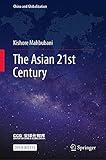The Asian 21st Century [electronic resource] / by Kishore Mahbubani.
Tipo de material: TextoSeries China and GlobalizationEditor: Singapore : Springer Nature Singapore : Imprint: Springer, 2022Edición: 1st ed. 2022Descripción: VII, 270 páginas3 ilustraciones, 2 ilustraciones in color. online resourceTipo de contenido:
TextoSeries China and GlobalizationEditor: Singapore : Springer Nature Singapore : Imprint: Springer, 2022Edición: 1st ed. 2022Descripción: VII, 270 páginas3 ilustraciones, 2 ilustraciones in color. online resourceTipo de contenido: - texto
- computadora
- recurso en línea
- 9789811668111
- 320.95 23
The Hypocrisy of the West -- Trump, Macron and the Poverty of Liberalism -- Democracy or Plutocracy? -- America's Existential Question -- Can America Escape Plutocracy? -- What Do US Capitol Attack and the West's Covid-19 Death Rates Have in Common? -- Was Trump Right or Wrong on China? Biden's Answer -- Will Shape the Future -- Why the Trump Administration Has Helped China -- Why American Presidents Matter -- What Biden Will Mean for the Rest of the World -- East and West: Trust or Distrust? -- Great Battles Require Strategic Discipline-and Washington Needs It in This Crisis.
Open Access
This open access book consists of essays written by Kishore Mahbubani to explore the challenges and dilemmas faced by the West and Asia in an increasingly interdependent world village and intensifying geopolitical competition. The contents cover four parts: Part One The End of the Era of Western Domination. The major strategic error that the West is now making is to refuse to accept this reality. The West needs to learn how to act strategically in a world where they are no longer the number 1. Part Two The Return of Asia. From the years 1 to 1820, the largest economies in the world were Asian. After 1820 and the rise of the West, however, great Asian civilizations like China and India were dominated and humiliated. The twenty-first century will see the return of Asia to the center of the world stage. Part Three The Peaceful Rise of China. The shift in the balance of power to the East has been most pronounced in the rise of China. While this rise has been peaceful, many in the West have responded with considerable concern over the influence China will have on the world order. Part Four Globalization, Multilateralism and Cooperation. Many of the world's pressing issues, such as COVID-19 and climate change, are global issues and will require global cooperation to deal with. In short, human beings now live in a global village. States must work with each other, and we need a world order that enables and facilitates cooperation in our global village. .
No hay comentarios en este titulo.
